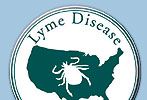

 |
 |
|
HOME / ABOUT US / AFFILIATES / CONTACT US / DOCTOR REFERRAL / DONATIONS / ORDER BROCHURES |
|
|
Lyme Disease Association, Inc. |
|
|
INTENSIVE TREATMENT HELPS PEOPLE WITH CHRONIC LYME DISEASE Report from NIH-funded Columbia Study of Chronic Neurologic Lyme Disease
To be eligible for the study, patients had to have chronic Lyme disease with ongoing memory impairment. All had previously been treated with at least 3 weeks of IV antibiotics and relapsed. All patients in the study were tested with cutting-edge brain-imaging techniques, and significant improvement in neurocognitive function was seen over the 10-week IV antibiotic retreatment period. "This is the first randomized controlled trial of chronic neurologic Lyme disease; the results support the benefit of a repeated course of longer-term intravenous antibiotic therapy for patients with a return of cognitive problems", said Fallon. Lyme disease is caused by spiral-shaped bacteria carried by poppy-seed-sized ticks and is rapidly spreading throughout the United States. The numbers of cases reported to the Centers for Disease Control and Prevention (CDC) increased 40% to 24,000 cases in 2002. The CDC estimates that reported cases represent less than 10% of true cases─ about 240,000 Americans may have contracted new cases in 2002 nationwide. Almost 300 healthcare professionals from around the country attended the conference, which was held in Westchester County, New York, one of the country's most endemic areas. Lyme disease is a world-wide emerging infection representing 90% of all cases of vector-borne diseases in the US. It is often complicated by co-infections that make diagnosis and treatment more complex. Sherwood Casjens, PhD, University of Utah School of Medicine, and a renowned genome team including Claire Fraser, PhD, President, The Institute of Genomic Research (TIGR), presented new information that Borrelia burgforferi, the spiral-shaped bacteria that cause Lyme disease, are able to freely exchange genetic material among themselves, potentially making diagnosis and treatment difficult. The team of researchers concluded that frequent recombination may help the bacteria survive in ticks and in the animals they feed on, including humans. The research was published in the Sept. 28 issue of The Proceedings of the National Academy of Sciences. CONTACT Lyme Disease Association, Inc. 888 366 6611 |
Lyme Disease Association, New Jersey, Copyright 2005 - All Rights Reserved |
|
HOME PAGE / ABOUT US / INFORMATION / MAKE A DONATION / CONTACT US |